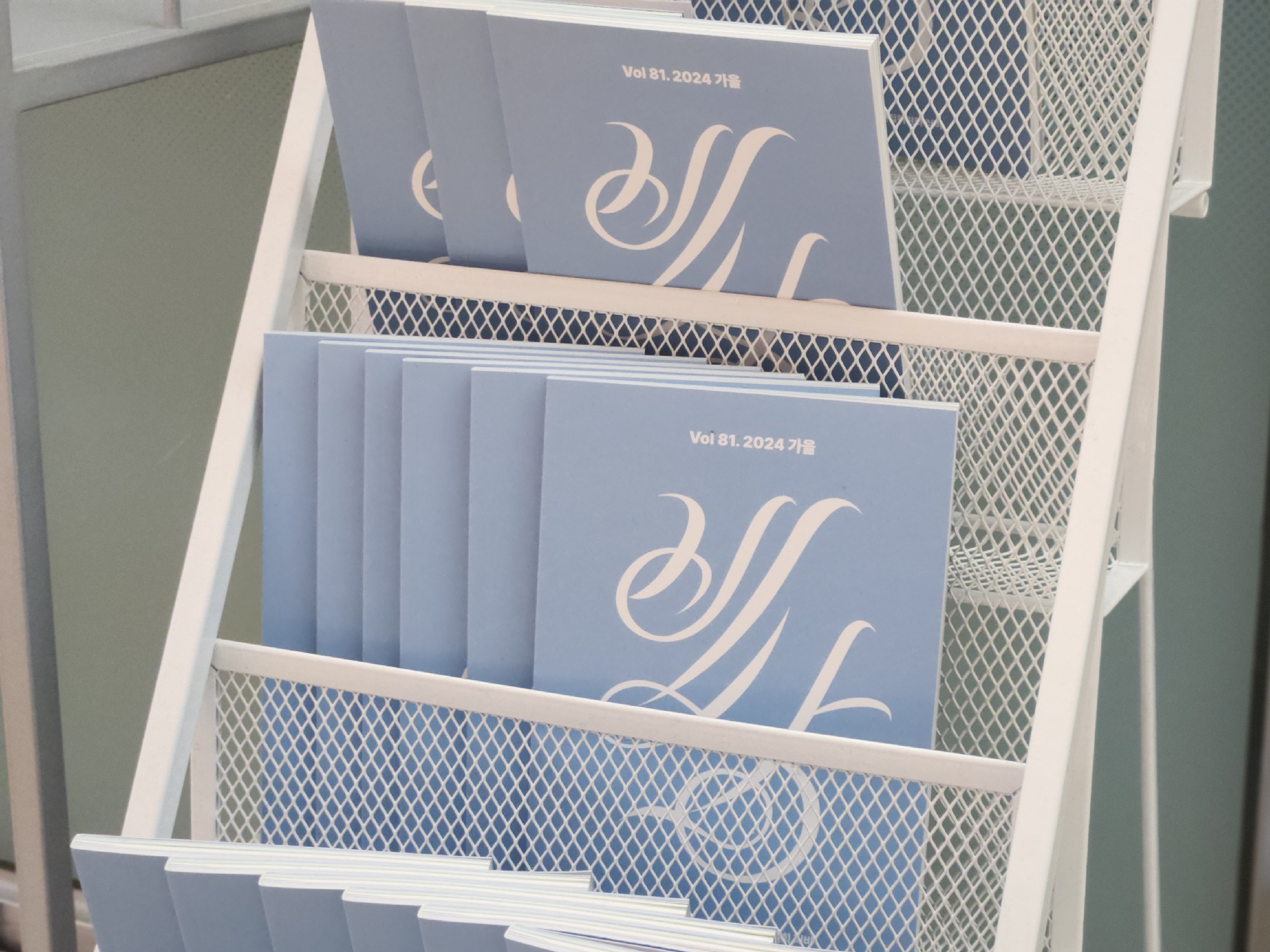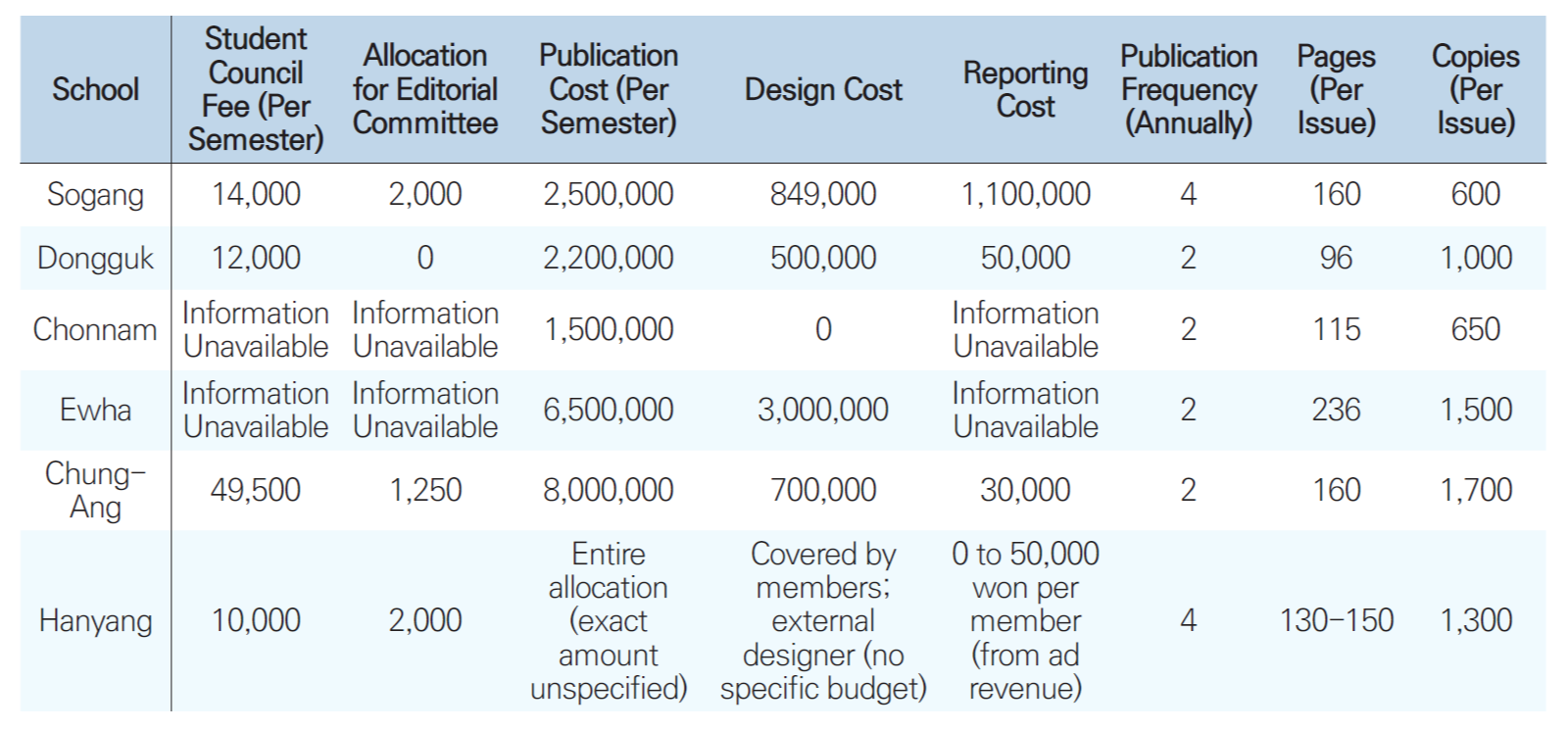

▲ RUBY Vol. 81 on the distribution stand at Eoui Hall
RUBY, SeoulTech's official campus magazine, began in 1984 as Eoui-munhwa and was renamed in 2005. As a special organization of the Student Council, it operates autonomously, allowing independent editorial decisions. Funded by student fees, RUBY focuses on producing contents that reflect the diverse interests of the student body. It also provides a platform for dialogue on relevant campus issues.
Understanding Student Fees and their Allocation
At SeoulTech, the student autonomy fee is a voluntary contribution made by students to support the activities of student organizations. Each semester, students can pay an additional 11,000 won during the tuition payment period. This fee is used to enhance student rights and improve overall satisfaction on campus.
SeoulTech has several central organizations, including the Student Council, Club Union, and Student Welfare Committee, as well as college-specific councils. Other groups include the Graduation Preparation Committee, Student Human Rights Committee, Financial Audit Committee, and the Editorial Committee (RUBY).
The student fee is allocated among these organizations, with RUBY receiving a portion to fund its magazine and newsletters. The Student Council uses the fees for ongoing projects and events, while the Club Union supports club activities and organizes events like the Club Fair. The Student Welfare Committee utilizes the funds for various initiatives to promote students' well-being. Overall, these fees play a crucial role in enhancing student engagement and welfare on campus.
Unilateral Cuts Spark Controversy
On September 23, RUBY announced on its social media that they had received an unexpected notification about budget cuts from the Student Council, Club Union, and Student Welfare Committee. This decision, communicated on September 20, ignited a fierce debate among the student organizations involved. In response to RUBY's initial statement, the other organizations quickly released their own statements, each defending its positions. RUBY claimed they were informed of a large reduction in funds (1,000 KRW per student) without prior consultation, while the Student Council countered that they had repeatedly sought to discuss budget adjustments but were met with resistance from RUBY. This contradiction raises questions about the communication process and the validity of each party's claims. RUBY emphasized that they had not received clear explanations for the budget cuts, while the Student Council maintained that they had followed appropriate procedures for budget discussions.
In response to the situation, RUBY highlighted three key issues: the exclusion of members from important meetings, the misrepresentation of informal discussions as official statements, and unfounded accusations of pressuring the council. Meanwhile, the Student Council expressed concern over RUBY's budgeting practices, noting that discrepancies in spending and a lack of documentation had contributed to the decision to cut funding.
Both parties expressed a desire for improved communication moving forward. The Student Council affirmed their commitment to better collaboration and transparency in future discussions, recognizing the importance of supporting student initiatives. This ongoing conflict underscores the challenges of managing student fees and the need for effective dialogue among student organizations at SeoulTech.
Looking Ahead: Insights from Other Universities
As the discussion continues, it's essential to consider how other university editorial committees handle their design budgets and student fees. By examining these practices, SeoulTech can find ways to foster collaboration and transparency in its own financial decisions.
By collecting the financial data from several universities and insights from editorial members, The SeoulTech analyzed the current state of student media, the struggles they face, and their role on campus.

The Financial Strain on Student Publications
Data from six universities shows that the average student activity fee allocated to the editorial committees is about 1,312.5 won per student each semester. While this is a small portion of the overall fee, it turns out to be crucial for the survival of these publications.
At Sogang University, students pay 14,000 won per semester, of which 2,000 won goes to student media, including the editorial committee. In contrast, Dongguk University allocates no direct funding for the editorial committee, leaving them to rely entirely on advertising revenue. On average, editorial committees spend 4.14 million won per semester on publishing costs, with design expenses averaging 1 million won and reporting costs around 393,333 won.
Despite these costs, many editorial committees struggle to sustain their publications. Ewha Womans University spends 6.5 million won per edition, while Chung-Ang University spends up to 8 million won. Smaller institutions like Chonnam National University operate on 1.5 million won, highlighting the wide range of financial constraints.
The Role of Student Media Beyond Financial Numbers
Aside from financial concerns, campus magazines play a key role in providing a platform for student voices. In an environment where certain issues overlooked by mainstream media, student publications provide space for a diversity of topics and perspectives. Other university papers such as that of Sogang University allow for long-form articles and deeper analysis, contrasting with campus newspapers that only publish shorter articles with limited perspective.
Many editorial committees value their editorial independence, as they are not subject to university censorship. This freedom allows them to explore important social issues like feminism and labor rights, topics that may be sensitive or overlooked by other media outlets on campus.
The Impact of Potential Budget Cuts
Despite their important role, many editorial committees are under financial pressure due to potential budget cuts. The editorial committee of Hanyang University expressed concern that any further cuts to student fees could make it impossible for them to continue publishing. The funds currently received are used solely for printing costs, leaving little room for anything else. Sogang University similarly faces difficulties and has warned that reductions in funding could limit their ability to produce quality content.
Financial instability has already affected Ewha's, which faced a 1.4 million won deficit and had to turn to crowdfunding to stay operational. These situations demonstrate the precarious position that many student publications find themselves in.
Why Independent Student Media Still Matters
Even with these challenges, many editorial committees are committed to maintaining their presence. The Dongguk University editorial committee aims to serve as an alternative media outlet that highlights voices often left out of mainstream conversations.
Chung-Ang University, which has faced restrictions in the past due to critical coverage, continues to fight for editorial independence.
Hanyang University believes that the role of editorial committees is not just to report the facts but to represent the student body's perspectives. In a time when student governance and engagement are declining, the role of independent student media becomes even more crucial.
The data shows a clear need for continued support to campus magazines. The average number of issues published each year across these universities is 2.67, with each edition averaging around 151 pages and a circulation of 1,125 copies. However, without adequate funding, these numbers may decrease, and student voices may be further marginalized on campus. Campus magazines are not just news outlets; they provide a platform for free expression and meaningful dialogue.
Reporter,
Jieun Park pk325382@g.seoultech.ac.kr


 Comment 0
Comment 0 Posts containing profanity or personal attacks will be deleted
Posts containing profanity or personal attacks will be deleted